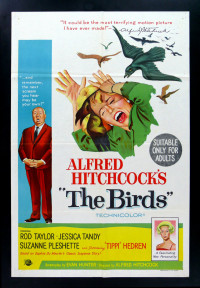


Camille Paglia's The Birds in a second edition is the latest volume in the BFI Film Classics series.
Ms. Paglia’s stated goal is “for readers to experience the film, with all its quirky twists and turn, as if it were literally unfurling before their eyes. Nothing is insignificant in a Hitchcock film." True, and once she gets going, the associations and call backs and allusions and insights flow. The first part of the book is the introductory “making of” material, but once she gets past that, there is barely a single sentence that doesn’t unveil some interesting facet of the film. Like Richard Deming in the previous week’s Touch of Evil BFI book, she suggests that the director adopts non-realist modes. “Hitchcock was a premiere modern surrealist, learning from Luis Buñuel and Salvador Dalí at the dawn of their avant-garde careers.” She adds, “Hitchcock approached The Birds with the documentary naturalism that is the necessary first term of Surrealism – the modernist style to which his work properly belongs and whose pioneers he explicitly acknowledged.”
This passage from page 71 about the birds chasing the school children down the street gives the flavor of the prose: “It’s another race, this time foot versus wing. Like Furies, the crows harass the children from behind, nipping their necks and cheeks, as we seem to slide helplessly backward downhill, with the mob about to trample us. There’s a tremendous noise of mingled screams and raucous bird cries. After the first flash of real horror, I generally settle down to laughing and applauding the crows, whom I regard as Coleridgean emissaries vandalizing sentimental Wordsworthian notions of childhood. It’s like my idol Keith Richards cuffing about Pollyanna and Beaver Cleaver. There’s an exuberant, Saturnalian, Mad magazine zaniness to the whole grisly business. Hitchcock’s victims will graduate to sadists in a scene in Roger Vadim’s Barbarella (1968), clearly influenced by this one, where Jane Fonda is attacked by an advancing battalion of fanged dolls who take bloody nips out of her legs and chain mail. “
At times the book feels like a supplementary chapter to her famous book Sexual Personae.
Ms Paglia's presentaion is a highly personal view, almost like an audio commentary track. She is unceasing in her praise for Tippi Hedren, and is utterly convincing. She expresses irritation whenever kids are on the screen – she seems to hate children, or at least their sentimentalization. She bemoans the moment that the Suzanne Pleschette character dies instead of little Cathy. This performer with her sardonic and world wise demeanor is a great addition to The Birds.
The film is available in many iterations on Universal DVD, but the best one has a reconstruction of a missing scene between the Rod Taylor and Hedren, which I wish that they had survive, if only to hear more of Rod Taylor's sincere and unexpectedly real line deliveries. There is also the unusual trailer for the film, which shows no scenes from the film and which is patterned after the famous trailer for Psycho. Another good extra is a reconstruction of the originally planned ending, a flight from the farm house down the twisting roads of the coast highway.
As for the Birds book, I part ways with the author when it comes to the subject of Hitchcock as predator. I feel that she gives the statements from Ms Hedren about sexual harassment too much weight. I’m sure that the actress believes what she says happened, but in truth the situation comes across more as a clash of codes of behavior, Hitchcock’s racy humor versus her midwestern puritanism, than a dependable case of harassment. In the intro she writes, “Expecting great artists to live exemplary lives was a premise of Victorian moralism discarded by the first generation of modernists. In an essay on gender for the BFI’s massive retrospective of Hitchcock films in 2012, I wrote: ‘Misogyny is a hopelessly simplistic and reductive term for the passionately conflicted attitude of major male artists toward women.’ What Hitchcock records in his films is ‘the agonized complexity of men’s relationship to women.’ There is a psychological turbulence going on in sexuality that cannot be fully understood by political paradigms.” I agree, but she doesn’t need to defend Hitchcock against charges of sexual opportunism, For one thing, no other performer has made any such charges – yet, anyway – and only one book makes the claim. On the other hand, Patrick McGilligan, the most recent Hitchcock biographer, discounts the stories. That being said Paglia makes a strong case for Hendren’s performances for Hitchcock, and re-watching The Birds proves that Hedren truly was one of Hitchcock’s best performers.

